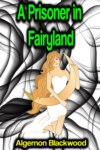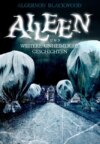Cilt 500 sayfalar
A Prisoner in Fairyland

Kitap hakkında
A Prisoner in Fairyland – Algernon Blackwood – In the train, even before St. John's was passed, a touch of inevitable reaction had set in, and Rogers asked himself why he was going. For a sentimental journey was hardly in his line, it seemed. But no satisfactory answer was forthcoming – none, at least, that a Board or a Shareholders' Meeting would have considered satisfactory. The old vicar spoke to him strangely. «We've not forgotten you as you've forgotten us,» he said. «And the place, though empty now for years, has not forgotten you either, I'll be bound.» Rogers brushed it off. Just silliness – that was all it was. But after St. John's the conductor shouted, «Take your seats! Take your seats! The Starlight Express is off to Fairyland! Show your tickets! Show your tickets!» And then the forgotten mystery of his childhood came back to him. . . .
Algernon Henry Blackwood, CBE (14 March 1869 – 10 December 1951) was an English broadcasting narrator, journalist, novelist and short story writer, and among the most prolific ghost story writers in the history of the genre. The literary critic S. T. Joshi stated, «His work is more consistently meritorious than any weird writer's except Dunsany's.» and that his short story collection Incredible Adventures (1914) «may be the premier weird collection of this or any other century».
Blackwood was born in Shooter's Hill (now part of south-east London, then part of north-west Kent). Between 1871 and 1880, he lived at Crayford Manor House, Crayford and he was educated at Wellington College. His father, Stevenson Arthur Blackwood, was a Post Office administrator; his mother, Harriet Dobbs, was the widow of the 6th Duke of Manchester. According to Peter Penzoldt, his father, «though not devoid of genuine good-heartedness, had appallingly narrow religious ideas.» After he read the work of a Hindu sage left behind at his parents' house, he developed an interest in Buddhism and other eastern philosophies. Blackwood had a varied career, working as a dairy farmer in Canada, where he also operated a hotel for six months, as a newspaper reporter in New York City, bartender, model, journalist for The New York Times, private secretary, businessman, and violin teacher.
Throughout his adult life, he was an occasional essayist for periodicals. In his late thirties, he moved back to England and started to write stories of the supernatural. He was successful, writing at least ten original collections of short stories and later telling them on radio and television. He also wrote 14 novels, several children's books and a number of plays, most of which were produced, but not published. He was an avid lover of nature and the outdoors, as many of his stories reflect. To satisfy his interest in the supernatural, he joined The Ghost Club. He never married; according to his friends he was a loner, but also cheerful company.
Jack Sullivan stated that «Blackwood's life parallels his work more neatly than perhaps that of any other ghost story writer. Like his lonely but fundamentally optimistic protagonists, he was a combination of mystic and outdoorsman; when he wasn't steeping himself in occultism, including Rosicrucianism, or Buddhism he was likely to be skiing or mountain climbing.» Blackwood was a member of one of the factions of the Hermetic Order of the Golden Dawn, as was his contemporary Arthur Machen. Cabalistic themes influence his novel The Human Chord.









